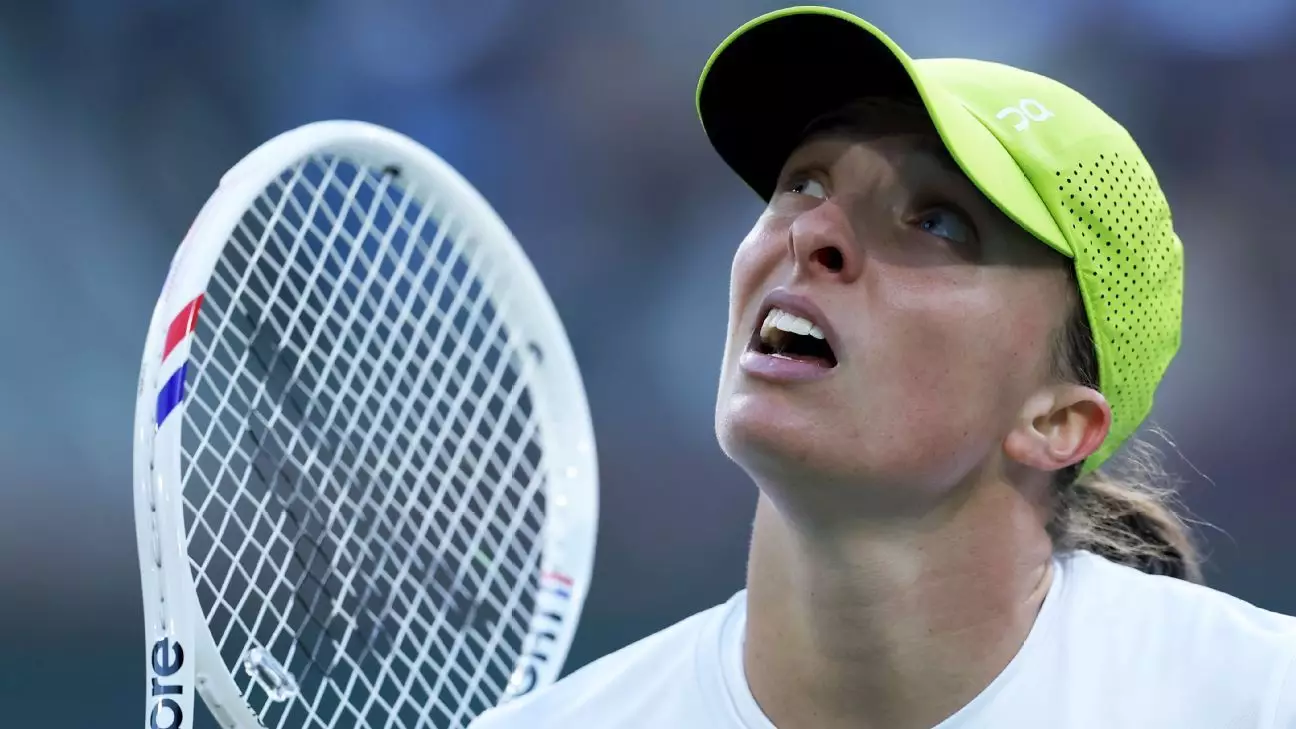In the high-stakes realm of professional sports, few athletes bear the weight of expectation and scrutiny as acutely as Iga Swiatek. The Polish tennis sensation, a five-time Grand Slam champion, recently candidly unveiled her emotional turmoil and the relentless scrutiny that accompanies her career. In the lead-up to the Miami Open, Swiatek shared a heartfelt post addressing not only her frustrations on the court but also her struggles off it, revealing a layered complexity that is often overlooked behind an athlete’s public persona. Her decision to address the online criticism following an emotionally charged moment during a match highlights the unsparing gaze under which sports professionals operate.
Unpacking Emotional Vulnerability
Swiatek’s reflection on her emotional state, particularly during periods of hardship, raises important questions about vulnerability in elite sports. She mentioned “three weeks crying daily,” a stark contrast to the focused, victorious persona fans are accustomed to seeing. This moment of candidness strips away the polished veneer of professional athletes, inviting us to grapple with the reality that behind every champion lies a human being with feelings and challenges. The narrative around her behavior during matches – described as immature or hysterical by some critics – reveals an unjust duality; it seems that athletes cannot win, irrespective of whether they display stoicism or raw emotion.
The criticism she faced after a frustrated outburst during a match, where she nearly struck a ball boy, exemplifies this scrutiny. Swiatek stated that what was meant as a harmless release of frustration was blown out of proportion, leading to backlash instead of understanding. This raises vital discussions regarding the expectations placed on athletes to always maintain composure and how such rigid standards can stifle emotional authenticity.
Judgment in the Eye of the Storm
In her post, Swiatek articulated a weariness with the “constant judgment” she faces, emphasizing a growing frustration with the public’s tendency to leap to conclusions about her character based on isolated incidents. The dichotomy of being labeled either robotic or hysterical based on her emotional expression reflects a broader societal issue—the struggle to normalize vulnerability and the range of human emotion in competitive environments.
It is fascinating to note how society often seeks to box individuals into predefined categories. An athlete who expresses joy is celebrated, while one who exhibits frustration is chastened. Swiatek’s experience serves as a poignant reminder that the emotional spectrum is not only natural but integral to the human experience. This reflects a double standard where athletes, expected to be paragons of discipline and control, slip under the weight of public opinion.
The Shadow of Doping Controversy
Swiatek’s candid revelation also delves into the chaos of the doping allegations that plagued her career, adding layers of complexity to her mental state. Despite having her case resolved, the stigma attached to such allegations can linger long after the facts are out. As she recounted the toll the situation took on her career aspirations, it becomes clear that the mental health of athletes is deeply intertwined with their professional trajectories.
Athletes like Swiatek are often thrust into headlines and become subjects of speculation, sidelined by circumstances beyond their control. In her case, the contamination that led to the doping scare was an accident, yet navigating the fallout requires not only personal resilience but a robust support system. The importance of addressing mental health in sports is paramount; Swiatek’s post serves as a call to reconsider the narrative around athletes, advocating for empathy over judgment.
The Path Forward
As Swiatek continues to compete, her journey shines a light on the necessity of open dialogue surrounding emotional health in sports. By utilizing her platform to express her truth, she is not just advocating for herself but for many athletes who may feel similarly trapped in the judgmental world of competitive sports. This level of transparency is not commonplace, but it is crucial to foster an environment where athletes can thrive both physically and emotionally.
Her experiences illustrate that while victories on the court garner applause, the battles fought within are the true testament to one’s strength. In sharing her vulnerabilities, Swiatek is redefining what it means to be a strong athlete, one who is capable of triumph not just through physical prowess but through emotional honesty and resilience.


Leave a Reply